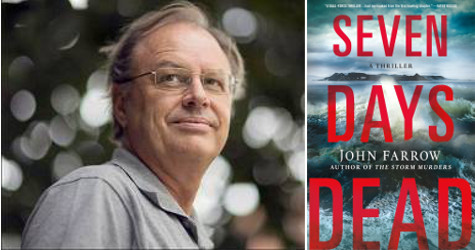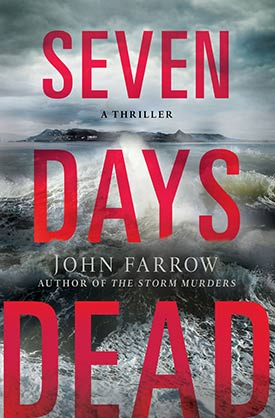
John Farrow, author of the Storm Murders Trilogy, was able to answer some of CrimeHQ's questions about his retired detective, Émile Cinq-Mars, his new book, Seven Days Dead, and what we can expect in the final book of the series!
Why choose a retired detective?
The first Émile Cinq-Mars novel, City of Ice, was published in 1999, when my detective was in the prime of his career. As time has moved along, I’ve chosen to age him naturally. He depends upon his wit and wisdom rather than physical prowess, so he can still do the job his way, even as he gets older.
The benefits of allowing him to retire are various. He maintains all the police connections in the world (literally) and can make use of them, but he’s no longer subject to any department’s rules or bureaucracy. This allows him to travel off his turf at will, and as an example of that, in Seven Days Dead, he’s on a vacation island. He no longer requires anyone’s permission to stick his nose into other people’s business.
How Cinq-Mars does get involved in a case requires an additional level of storytelling, which I hope to keep interesting and fun. Without the advantage of a badge and a gun, and without any official authority, he has to be both clever and diplomatic in how he interviews a suspect or a witness, and that, again, adds an additional layer of storytelling and fun as well as suspense and complication. So, in a sense, he now combines all the experience and knowledge of the police procedural detective with the freedom and range of the amateur sleuth, yet without being an amateur.
Finally, ageing has its challenges and its developments for anyone, and they can be interesting to explore here, whether by the young or by the old.
What made you want to write this series?
Having a main character who is worth the writer’s investment over, hopefully, many books is a Godsend, and both my enjoyment in Émile Cinq-Mars and the feedback from reviewers and readers alike has convinced me that I have that guy. He’s someone whose interests and intelligence keeps me hopping to keep up with him, and there’s nuance, moral stance, and complexity to his nature that keeps me and, hopefully, readers engaged.
I’ve done the big books with Cinq-Mars in which he goes up against mob figures and biker gangs, the CIA, and all that, and I did a novel with him that covered 450 years of Montreal history. After those “big” books, the current series, that I’m calling the Storm Murders Trilogy, allows my detective to get into other crimes that are intricate and lethal and quite puzzling.
I’m enjoying the series because Cinq-Mars is severely challenged to put his acumen to the test. In these books, he is usually going up against very smart, very bad people—or, the very smart people in the story are being foiled by a ruthless person in their midst. Either way, the cases are quite complicated and involved, digging into the social strata of the setting.
Unravelling the case requires delving into human nature, matching wits with friends and opponents alike, and comprehending both the history of those involved and the passions of the moment. That keeps me challenged and engaged, which hopefully will be reflected in these novels.
Tell us about the storm in Seven Days Dead
 As a recreational sailor and racer, I’ve known a few storms where I was gritting my teeth and, at least once, hanging on for dear life—which in that instance was to a wire. So waves and wind and dark nights are known to me, which, when married with my imagination, was all I needed.
As a recreational sailor and racer, I’ve known a few storms where I was gritting my teeth and, at least once, hanging on for dear life—which in that instance was to a wire. So waves and wind and dark nights are known to me, which, when married with my imagination, was all I needed.
By osmosis, however, in a lifetime of reading sailors’ adventures, I know what people face out there. I’ve also had many conversations with the fishermen of Grand Manan, where the novel is located, so I know what they have faced over the years.
While I had no specific storm in mind, I wrote the scene with the same respect for the sea and the weather that any person in a small boat in the midst of a tempest acquires.
Favorite line in Seven Days Dead
“Keep your knives sharp,” Roadcap warns them.
Aaron Roadcap is warning his neighbors that trouble lies ahead. We are aware of a couple of violent deaths by this point in the narrative, but the warning suggests that what’s happening on the island is more pernicious and more complex than one man killing another over a grievance.
We are discovering that communities of people may be at war and that a danger flag is being raised to its highest level. The line is in-keeping with a community of poor dulse-cutters, who harvest seaweed for a living and, therefore, commonly carry knives while they are working.
The warning suggests that they now keep their knives sharp for more sinister purposes as well, but at this point, the reader is still unaware of all the ramifications but is now being forewarned.
Tell us about the next novel in the Storm Murders Trilogy
At the present moment, the third title in the Storm Murders Trilogy is Perish the Day. Émile Cinq-Mars has accompanied his wife to her childhood home in New Hampshire, where her mother is dying and their niece is graduating university. During a vicious rainstorm, rivers flood their banks and streets “pitch off their manhole covers,” and at the height of the storm, a friend of the niece is murdered on campus.
Cinq-Mars pokes his nose in, only to find himself swept up in a series of deaths that seem unconnected, and yet, links will gradually be revealed. The troubling issue of rape on campus is explored in this novel, as is the recruitment of students for secretive institutions.
What do you want readers to feel after reading Seven Days Dead?
I hope that readers will feel that they have visited, and learned about, a different, special place and met unique people. These days, Grand Manan is, unfortunately, famous for arson as a method of resolving disputes and is a troubled island. I’d want readers to feel that they’ve been through an intriguing mystery in a real place, one that revealed both the mystery and the place to them and that they really enjoyed both the likeable and the not-so-likable characters.
As a New York Times reviewer stated:
“Farrow is an authoritative writer who creates characters with depth and plots that say something about them. (Even a minor character like a burnt-out officer with the Royal Canadian Mounted Police makes a strong impression on his ‘do-or-die posting.’)”
The novel has its chills and spills, it’s harrowing moments, and a slow-build of suspense and complication, and I hope that readers will feel that they have enjoyed all that, yet what remains memorable will be the place and the people they encountered along the way.
To learn more or order a copy, visit:
opens in a new window![]() opens in a new window
opens in a new window![]()
John Farrow is the pen name of Trevor Ferguson, is a literary legend in his native Canada. He has written eleven novels and four plays, all to extraordinary acclaim and was named Canada's best novelist in both Books in Canada and the Toronto Star. He makes regular visits to the U.S. to attend conferences like Malice Domestic and Thrillerfest. He is the author of The Storm Murders, the first book in his Storm Murders series.
